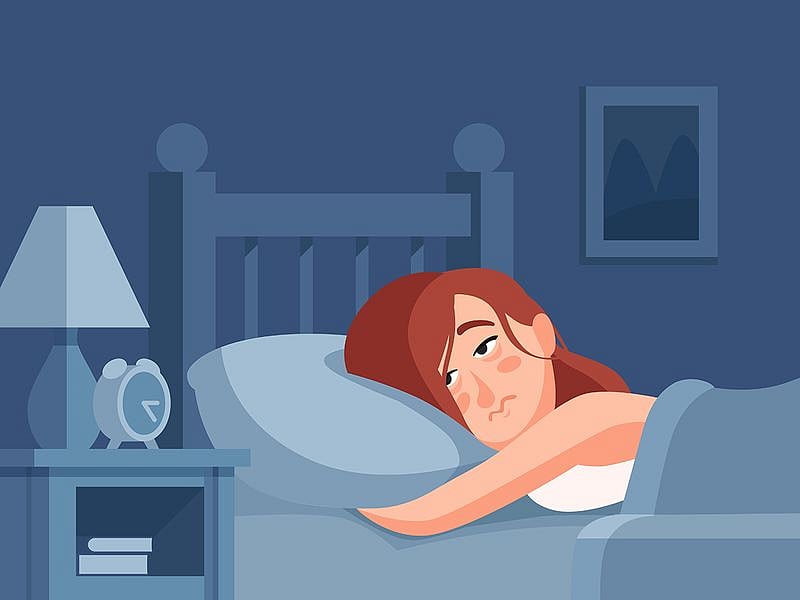Your sleep struggles may have nothing to do with stress — check your vitamins
Vitamin deficiencies can disrupt sleep by throwing off hormones and circadian rhythms

Struggling to fall asleep, waking up at odd hours, or hitting snooze three times before dragging yourself out of bed? Before you blame stress, caffeine, take a closer look at what you’re eating — or not eating.
Vitamin deficiencies can significantly disrupt sleep by interfering with the body's ability to regulate hormones, neurotransmitters, and circadian rhythms, a Anum Saif, General Practitioner at Aster Clinic, Liwan explains. “Several key vitamins play a direct role in promoting healthy, restful sleep.”
Here’s how the right nutrients can help you finally get a full night’s rest.
Vitamin D
Vitamin D is crucial for keeping your body clock running on time. Studies show that people with low vitamin D are about 50 per cent more likely to report poor sleep quality, shorter sleep duration, and increased daytime sleepiness. Deficiency has even been linked to higher risk of sleep apnea. “Vitamin D receptors are present in the brain regions that control the sleep–wake cycle,” Dr. Saif explains. “When levels are low, circadian rhythms can go off track, leading to insomnia or fragmented sleep.”
Lifestyle fix: Get 15–20 minutes of safe sun exposure daily, include vitamin D-rich foods like salmon, eggs, and fortified dairy in your diet, or consider supplements if recommended by a doctor.
B-Vitamins
B-vitamins, especially B6, B12, and folate (B9), are essential for healthy sleep chemistry. B6 converts tryptophan into serotonin, which later becomes melatonin, the hormone that signals it’s time to sleep. Without this, you might have restless sleep and vivid, unsettling dreams.
Vitamin B12 helps keep your body clock in sync, so you feel awake during the day and sleepy at night. When levels run low, it can throw your sleep–wake cycle off balance — leading to insomnia or even that heavy, can’t-keep-your-eyes-open daytime fatigue.
Folate plays a similar role in keeping your nights restful. A deficiency has been linked to insomnia and restless legs syndrome — that uncomfortable urge to move your legs just as you’re trying to drift off — making it harder to fall asleep and stay asleep.
Lifestyle fix: Eat a varied diet with leafy greens, lentils, eggs, fish, and whole grains. Vegans may need a B12 supplement, as plant-based sources are limited.
Vitamin C: The anti-stress nutrient
Vitamin C is often associated with immunity, but it also plays a role in stress management and reducing inflammation — both of which affect sleep quality.
A large study titled The Association Between Dietary Vitamin C and Sleep Disorders: A Cohort Study, published in the journal Nutrients, showed that over 68,000 people found that those with higher vitamin C intake had a significantly lower risk of sleep disorders and sleep apnea. Another study linked higher blood vitamin C levels with fewer complaints of “trouble sleeping.”
Lifestyle fix: Go beyond oranges — bell peppers, strawberries, kiwis, and broccoli are excellent sources.
Vitamin E: The quiet brain protector
Vitamin E helps protect brain cells from oxidative stress and supports hormonal balance. Though research is still emerging, some studies suggest that a deficiency could worsen sleep apnea symptoms.
Lifestyle fix: Add nuts, seeds, and olive oil to your meals to boost vitamin E intake naturally.
Magnesium: The (Non-Vitamin) sleep mineral
While not a vitamin, magnesium deserves special mention for its powerful link to sleep. It activates GABA, a calming neurotransmitter that helps the brain slow down at night. Low magnesium has been linked to insomnia, anxiety, and nighttime muscle cramps.
Lifestyle fix: Include magnesium-rich foods such as spinach, pumpkin seeds, dark chocolate, and whole grains in your diet, or discuss supplementation with your doctor.
Should you get tested?
“If you’ve tried improving sleep hygiene — reducing caffeine, sticking to a consistent bedtime, and limiting screens — but still can’t get quality rest, it’s worth checking vitamin D, B12, folate, and magnesium levels,” says Dr. Saif. Correcting deficiencies can make sleep hygiene strategies more effective. “Think of it as giving your body the raw materials it needs to produce melatonin, relax the nervous system, and maintain restorative sleep,” she adds.
Good sleep isn’t just about blackout curtains and fancy pillows. It starts with what’s on your plate. Balancing key vitamins and minerals can help you fall asleep faster, sleep more deeply, and wake up refreshed.
Network Links
GN StoreDownload our app
© Al Nisr Publishing LLC 2025. All rights reserved.